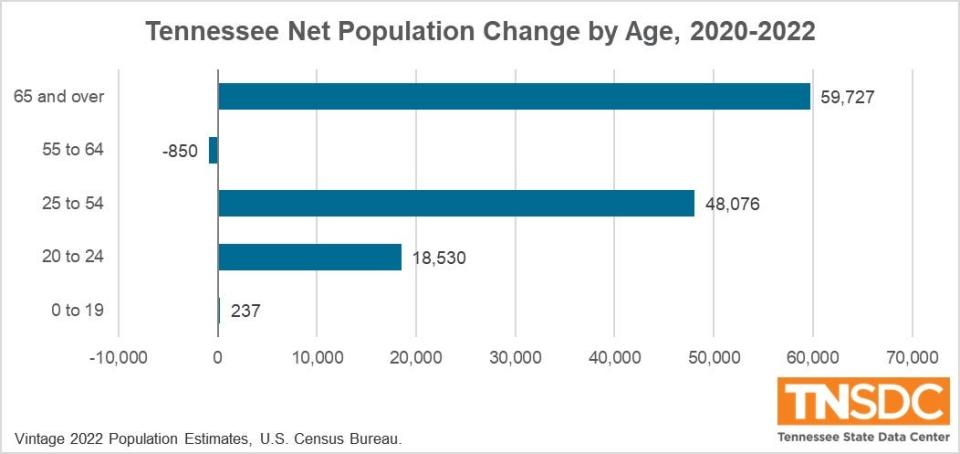Why baby boomers are driving the graying of Tennessee's population
Call it the baby boomer effect. The entire country's population is graying, and Tennessee is no exception.
The University of Tennessee's State Data Center released a report this fall that documented the effects of the post-war baby boom on the state's senior population, which first became evident in 2011 when the first baby boomers turned 65.
"Since then, the front-end of an 18-year wave of elevated births that occurred in 1946 has replaced a population cohort born in 1945," the report noted, adding that between 2010 and 2020, Tennessee's 65 and older population increased by 326,000 people.
According to the report, the state’s retirement-age population grew by nearly 60,000 people just between 2020 and 2022.
"What we were trying to get at was looking at the process of aging, how the number changes significantly due to the size of the baby boomer cohort," said Tim Kuhn, the director of UT's data center.
"For example, in 2021, there were 46,300 people aged 75 who were born in 1945," the report said. "Then in 2022, the first baby boomers ... turned 75. The increase was astounding; in just one year, the age 75 cohort added 18,900 people."
That baby-boomer-fueled growth is not expected to slow down any time soon. The last members of the baby boomer generation, which totals more than 75 million members nationwide, will hit their 60s starting in 2024 and enter retirement age by 2029.
Tennessee's economic outlook for 2024: What to know about jobs, wages and housing
More seniors moving to Tennessee
A small percentage of that elder boom is due to migration into the state, the report stated.
Tennessee has seen a steady upward trend in the share of its senior population that moved from a different state one year prior. In 2021, 1.8% of the state’s seniors had moved into Tennessee from another state, up from 1.5% in 2019.
"It’s clear that Tennessee’s desirability as a retirement destination is increasing," the report stated, noting that Tennessee does not collect individual income tax and offers relative affordability, both factors that are undoubtedly among those considered.

Tennessee transplants fuel increase in working age population
The data center found some good news on the labor force front, with the growth rate of Tennessee's prime working-age population matching the state’s overall increase at 1.8 percent. Tennessee has added 48,000 people between the ages of 25 and 54 since July 2020.
"This group of prime-age workers is important because it supplies a significant portion of the state’s labor force and is generally the most productive phase of a worker’s career," the report said.
The jump is primarily driven by net migration gains, the report said, with more prime-age population moving into the state than leaving. An analysis of data on interstate movers in 2021 showed that nearly 87% were younger than age 65 and the largest share (42.3%) were prime working age.
What's ahead for Tennessee?
The state's population of those 65 and older was 17.3% of the total in 2022, according to the U.S. Census. But that percentage is expected to soar by more than 300,000 within the next nine years, the Tennessee Commission on Aging and Disability said.
"If growth trends continue, those 60 and older will represent 25% of the state’s total population by 2030," the commission said in a report released last year.
In Knox County, as in other counties around the state, challenges faced by seniors include navigating the shortage of affordable housing, finding adequate health care, covering basic living expenses and accessing necessary community resources, a report by Knoxville-Knox County Planning stated.
"Growth of the senior population in Knox County over the next few years will lead to unprecedented demand for senior housing, care and resources," the report said, adding that matching supply to demand will have to become a priority for local leaders, homebuilders and service providers.
Liz Kellar is a Tennessee Connect reporter. Email liz.kellar@knoxnews.com.
Support strong local journalism by subscribing at knoxnews.com/subscribe.
This article originally appeared on Knoxville News Sentinel: Why Tennessee's population is increasingly older: It's baby boomers

